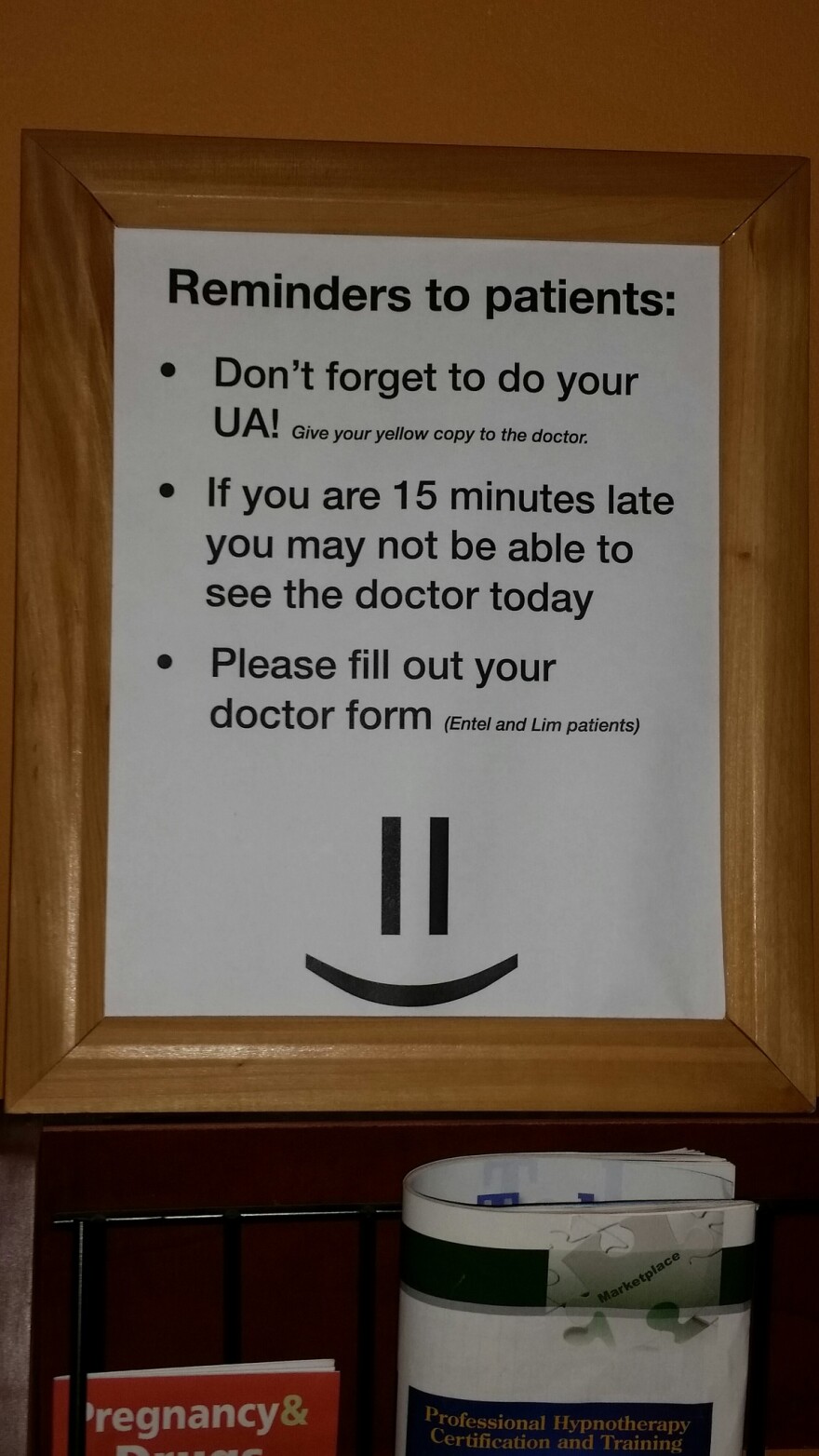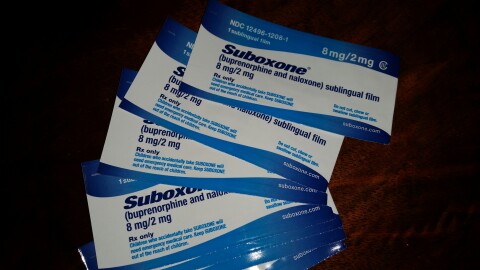Editor's note: This is Part 3 of our 5-part "State of Withdrawal" series. Click here for the other stories in the series.
LEWISTON, Maine - The LePage administration wants to take an unconventional approach to treatment for opiate addiction in Maine by dropping MaineCare insurance coverage for 3,000 methadone patients and moving them into Suboxone - or even Vivitrol - treatment that can be offered in a doctor's office.
Suboxone and Vivitrol are also effective opiate replacement medications. But critics say the plan is medically inappropriate for many patients. And in part three of our series "State of Withdrawal," Susan Sharon reports on another big challenge for the plan: a shortage of willing Suboxone providers.
Marty O'Brien is on the front lines of the opiate epidemic in Maine. "This is our main waiting area and these are all our counseling offices here," he says. The founder of a substance abuse recovery center known as Grace Street Services, O'Brien shows off his cavernous space in an old mill building in Lewiston. There is patient artwork on the walls, a small indoor skate park, a place to make furniture, and couches for patients to hang out.
Here, the philosophy is personal empowerment. And as he walks past a group therapy session, O'Brien says he has a problem. "We have, just in Lewiston, at least 30 calls a week requesting treatment," he says. "We're not able to keep up with it. And it's difficult because we want to."

Grace Street has four physicians who treat patients with Suboxone, and occasionally Vivitrol. O'Brien would like to hire more. He's also got recovery centers in Portland and Bath.
But around the state the story is the same: There aren't enough willing Suboxone providers to keep up with demand for an effective opiate replacement medication that's been on the market for 15 years. "If anything, people in the state have stopped doing it because they don't have the support or because it's just - it can be very messy," says Dr. Meredeth Norris.
****Norris is the medical director for Grace Street, as well as the medical director of two methadone clinics in southern Maine. "You are prescribing a medication that people can steal," she says. "It's not hard to overdose on it unless you mix it with other things. But the point is, we're not giving out blood pressure medicine here."
Federal regulations require Suboxone doctors to receive some training and certification before they can treat patients. And there's also a limit on the number of patients they can see - 30 for the first year and up to 100 with a waiver after that.
The LePage administration has a plan to funnel methadone patients on MaineCare into Suboxone treatment at a primary care doctor's office.
"Where the research is pointing is the value of providing an integrated environment between primary care and behavioral health and the treatment of addiction," says Mary Mayhew, the commissioner of the Maine Department of Health and Human Services. "That's where the research has demonstrated that there is greater opportunity and greater access to addiction treatment."
The state says the number of certified Suboxone providers in Maine is more than adequate to handle demand for treatment if they all took as many patients as they could. DHHS even has a list of what it says are 120 certified Suboxone physicians for patients to contact. The list comes from the federal Substance Abuse and Mental Health Services Administration.
Audio from voicemail: "Hi, you have reached the confidential voicemail of Dr. Timothy Rockcress. Please note that I am not currently taking new clients...beep."
Audio from voicemail: "Hello, this is Dr. Filene. I regret that I am not accepting new patients into my practice at this time. Thank you."
In fact, a check of the list revealed that most doctors had gotten out of Suboxone treatment entirely. Fewer than 15 could be found who said they would accept new Suboxone patients. And several had waiting lists or other restrictions.
One family physician on the list who is treating Suboxone patients is Dr. Ira Mandel in Rockport. "I'm treating patients but I'm not accepting any new ones at this time," Dr. Mandel says. "The reason I'm not taking any new patients at this point is that I'm mostly retired."
Mandel says he's been treating several dozen patients for the past eight years. Most of them, he says, need long-term treatment and are at high risk of relapse. "They're wonderful people," he says. "They're really good people - salt-of-the-Earth fisherman, people who - they're really trying to turn their lives around and all they want is a little bit of help. And the deck is really stacked steeply against them."
Mandel says he can't retire right now because his patients need him and there's nowhere else for them to go. "There's a lot of reluctance, or resistance, or just opposition to prescribing Suboxone by the few people in Maine who could do so. I find it interesting that the governor wishes to switch patients from methadone to Suboxone when there's a crisis, really, to the inadequacy in the number of physicians willing to prescribe."
Included on the state's list of Suboxone providers are 37 hospitals, counseling services and other treatment centers around the state. But more than half of them no longer provide Suboxone treatment. And those remaining often have long waiting lists.
Brent Miller says that's the case for Discovery House in Bangor. Discovery House treats both methadone and Suboxone patients. "The situation is that we have a long waiting list for people trying to get into the Suboxone. And when I say a long list - well over 75 people who, in some cases, have been there for months."
Miller says Discovery House has started offering cash bonuses for doctors willing to be trained and certified for its Suboxone program. It hasn't worked.
Dr. Steven Weisberger, a family physician in Jonesport says the shortage is especially challenging for addicts in rural parts of the state, like Washington County, where the opiate epidemic first took hold more than 15 years ago.
Weisberger treats Suboxone patients but says he's continually at capacity. "Our draw is really about a - I would say - a good 100-mile radius from where our practice is, so there's a lot of people coming in a lot of directions."
Weisberger says he's aware of only three Suboxone prescribers in Washington County and one of them is about to cut back. For these and other reasons, treatment providers say there's no way the state's plan can work. Even if all 3,000 methadone patients wanted to switch to Suboxone, there aren't enough doctors willing to prescribe it.
Dr. Kevin Flanigan at the Office of MaineCare remains unconvinced there's a shortage. "As you cited, there's 118 prescribers that are listed as available, and if they all have the ability to prescribe to 100 members, then there is adequate capacity in the system," he says.
And Flanigan says the state will work with any provider who wants to embrace the state's plan.




